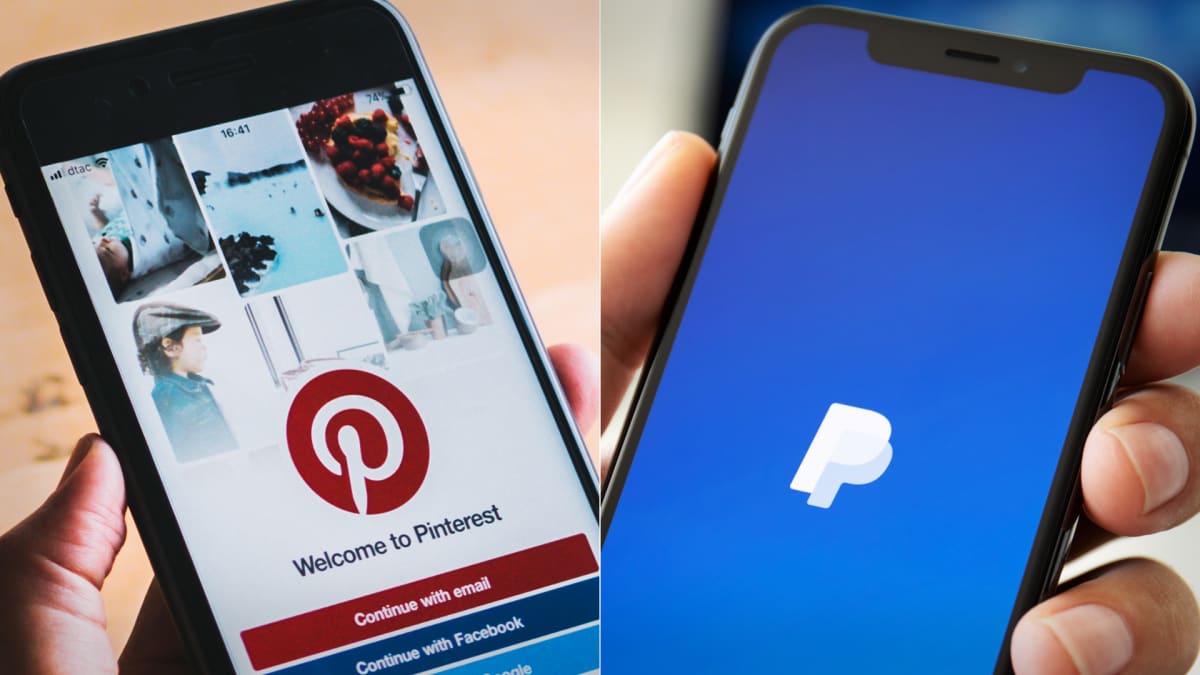
It's no secret that Pinterest (PINS) has been trying to make a deeper foray into the world of e-commerce for some time now.
In October of 2021, around the same time PayPal (PYPL) tried to acquire the visual scrapbooking company, it rolled out a virtual shopping livestream feature, not dissimilar to Amazon's (AMZN), which was met with mixed reception. Several months later in January, it rolled out a feature that allowed browsers to virtually try out products before actually buying them.
In June, Pinterest acquired The Yes, a personalized shopping app that uses artificial intelligence to make suggestions to users. The 40-person team and its CEO folded into Pinterest, while The Yes was subsequently shuttered and all operations and proprietary know-how were brought in-house.

Shutterstock
The Yes Was Pinterest's Pet Project...For a While
After it acquired The Yes, Pinterest promoted head of commerce Bill Ready to CEO and instated The Yes CEO Julie Bornstein as its head of shopping.
"Pinterest believes that THE YES’s leadership, innovative technology and talented team, combining shopping expertise with fashion industry credibility, will help accelerate Pinterest’s vision for it to be the home of taste-driven shopping," a press release said.
But seven months later, the marriage seems to be souring.
Pinterest announced Bornstein would be leaving her post as head of shopping and transitioning into an advisory role instead, with Bornstein calling the move "natural transition."
Pinterest's Problem Is Bigger Than It Realizes
Pinterest has been dogged by lackluster financials for years. While other high-flying technology companies benefited from bored remote workers in front of screens all day with built up savings to spend, Pinterest hasn't been able to convert eyeballs into impressive profit in the post-pandemic world.
Its Q3 2022 revenue may have been up 8% year-over-year, but its monthly active users stagnated and its net income declined by nearly $30 million year-over-year. It's no wonder, then, that the stock is down over 15% in the past year.
In the most recent earnings call, CEO Bill Ready re-emphasized the company's commitment to taking Pinterest from a social scrapbook to a virtual online shopping experience.
"While we have computer vision capabilities, machine learning, human curation at scale and over 1 billion items in our product catalog, we also need to continue growing our product catalog to enable more of these shopping experiences. To that end, we released our API for shopping to general availability in Q3 across all of our shopping-enabled countries, which include the U.S. and our largest markets in Europe, Latin America and APAC," Ready said.
Notably, Ready didn't give an estimate as to how much increasing those capabilities might cost.
But keen readers might wager a guess as to how expensive the endeavor might be: very.
What Pinterest Is Up Against
The issue here is twofold.
One, Pinterest was not uniquely positioned to grab a lot of market share while the getting was good. And its foray may now be too late. Rising interest rates and record inflation have squeezed consumer wallets and are forcing prospective shoppers to trim spending budgets.
Lots of competitors had beaten Pinterest to the chase when the getting was good, several years ago. Facebook parent company Meta (META) already has a popular and successful online shopping feature, which has been a flagship feature for years now (it's estimated nearly half of users have leveraged and/or bought a product while on the app).
The second problem is that Pinterest's financials aren't strong enough to take on what is certain to be a long, expensive endeavor into AR. Its budget is already creaking under its ballooning operating expenses, which were estimated to rise 35% in 2022. (Pinterest laid off employees, largely in its recruiting sector, in December).
Take it from Mark Zuckerberg, who recently made the difficult decision to lay off thousands of workers and is routinely questioned by those who remain for dumping billions of company dollars into his risky bet on the metaverse. And Meta's balance sheet is far more robust and proven than that of Pinterest's.
Of course, another issue is that Pinterest is a niche product serving a relatively niche demographic. Sure, millions of people (mostly women aged 25-34) use it to access things like recipes, interior design inspiration and tattoo ideas. But the quagmire remains. It doesn't have a robust video program. Its search and discovery feature is unwieldy and there is very little social interaction to it (when's the last time you heard somebody brag about being a Pinterest influencer?).
As Twitter has exhibited in recent months, convincing people to pay for extra things on an app they're used to surfing for free is a tricky business. Users balk at being upsold on a platform they were previously left unbothered on. And unless you have billions of dollars (or a headstrong CEO unbothered by bad press or detractors), you're probably going to turn a lot of people off when you start becoming QVC on iOS.







